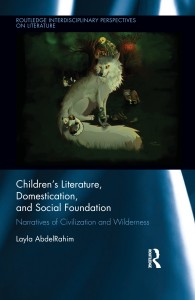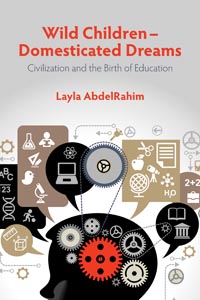I am an independent scholar and author with no institutional funding. Please, consider supporting me on Patreon so I can continue to do the work. Thank you!
Book review
Layla AbdelRahim, Children’s Literature, Domestication, and Social Foundation: Narratives of Civilization and Wilderness. New York: Routledge, 2015; 265 pp, Hardback ISBN 9780415661102; Paperback ISBN 9781138547810
Without much thinking, we often juxtapose wilderness and civilisation. The ontology of wilderness translates into anarchy, and the ontology of civilisation translates into order. However, Layla AbdelRahim shows that this neat and orderly dichotomy is a mere fad – the human world consists of wilderness, and of civilisation, and of endless shades of grey between the two.
In the introductory chapter, AbdelRahim introduces the main theoretical underpinnings of her work through descriptions of culture, wildness, civilisation, colonisation and literature. She proceeds with an interesting biographical perspective which illuminates the paths of her thinking, the diverse influences on her work, and her unusually cosmopolitan life trajectory. AbdelRahim was born in Moscow, in an inter-racial, inter-continental, and multi-lingual family. As a child she moved to Syria*, and later to Europe and Canada, and she speaks Russian, English, Arabic, and some Italian. It is at through this combination of influences, that she acquired the unique perspective that informs her critique of civilisation and wilderness.
In the first part of the book, AbdelRahim explores Epistemologies of Chaos and the Orderly Unknowledge of Literacy. Her work is based on analyses of a wide spectrum of primary sources such as Tove Jansson’s Moomin series, Nikolai Nosov’s The Adventures of Dunno and Friends, C.S. Lewis’s The Chronicles of Narnia, A.A. Milne’s Winnie-the-Pooh, and many others. AbdelRahim interprets these works through a selection of important theorists and philosophers including Foucault, Bourdieu, and Derrida; she also connects them to works of important anarchists such as Kropotkin and Zerzan. It is through this masterful connection between primary sources, philosophy, and (anarchist) theory, that AbdelRahim draws a powerful distinction between ‘”primitive” society, where members express gratitude for all creation and warn against futile destruction of life, from ‘civilised’ (consumer) society, which sees its meaning for existence in domestication, exploitation, and a birth-given right to devour’ (p1l4).
AbdelRahim’s critique is especially powerful in regard to the relationships between Kropotkin’s theory of mutual aid and Charles Darwin’s theory of evolution. She provides a nuanced understanding of Kropotkin’s work and emphasises that mutual aid does not imply personal disinterest. Similarly, she emphasises an often-ignored fact that Darwin’s theory was not just about the survival of the fittest. Using fictional accounts, she reminds readers that both theories are mere metaphors for describing a complex social universe, and explores the improbable scenarios, and shows the unfortunate consequences of applying these metaphors too literally. As often happens in anthropological research, AbdelRahim shows that the truth is hidden somewhere between the metaphors. …
Jandric, Petar. “Book review”. In Anarchist Studies, Vol. 26, #1; Spring 2018
(This excerpt from the review is on Questia.com)
* Layla lived in Sudan, not Syria.
Filed in: Uncategorized.









